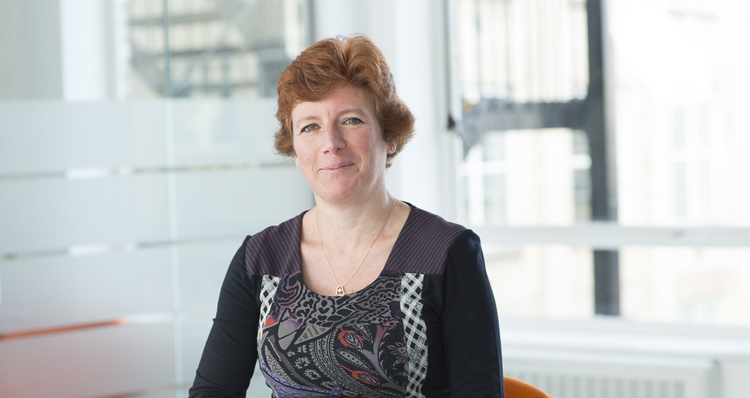Airmic’s board has appointed a new chair

Claire Combes takes will take over as chair of Airmic from 1 September.
Feelings of taking on a fresh challenge are familiar for Claire Combes, Airmic’s newly-appointed chair.
Her risk management career has spanned several interlinked disciplines in three decades, from chartered accountancy and taking responsibility for treasury and financial roles, before adding internal audit, health and safety, and insurance management to her expanding CV.
“Something I’ve learned in undertaking perhaps 20-30 different types of risk roles in my career is that everything is connected from a risk management perspective,” she says. “The relationships between risk and insurance and between overlapping disciplines are pervasive and fundamentally interlinked.”
From 1 September she will take over the chair role from Tracey Skinner, Airmic’s current chair, who has helped Airmic navigate through the pitfalls of the pandemic period. Alongside Julia Graham, Airmic’s new CEO since April, this gives the risk and insurance professionals’ membership body a different leadership line-up as the UK prepares to bring an end to the lockdown period of 2020-2021.
“I have no doubt it will be a challenging stint as Airmic’s chair, as well as an exciting one. As a long-term Airmic member I want to wear my heart on my sleeve to champion Airmic for the value it provides,” Claire tells Airmic News.
Her interaction at Airmic has been hands-on for many years, serving on a variety of board-level committees to contribute to Airmic’s governance and strategy, helping prepare her for the chair.
“From my existing role as chair of the Risk Steering Committee, as a board member, as well as on the Audit Committee, I can see that Airmic is coming out of this difficult period very strongly, helped enormously by Julia and Tracey’s hard work and strong leadership. Our attention is now turning to how we will continue to adapt for the future,” she adds.
A return to an office environment, partially, at least, is foremost in Claire’s mind. She began her latest full-time role as director of risk and assurance for easyJet in 2021, responsible for the airline’s risk management, internal audit, insurance buying, ethics and fraud prevention.
“For a lot of people this is the first time they will physically meet their colleagues, and certainly in my case that is exactly what’s happened. There are so many pros and cons to remote working. One of the great things about people learning to work differently over the past year is the better buy-in to flexible working and work life balance than there ever was before,” she says.
“There has always been the concept of flexible working, but it’s not something that’s been fundamental to every business culture. There’s now a greater acknowledgement than ever before that people can work hours other than ‘9-to-5’ and still get the job done, in many cases better than before,” she adds.
Claire is also keen to champion Airmic’s continued stance on issues of mental health and wellbeing as individual employees and their employers continue to cope with the effects of the pandemic.
“This focus on mental health and wellbeing is an area that a lot of business need to look at. We are living in a period of enormous change and people are trying to adjust, which has inevitably impacted some people more than others,” she says.
“From a risk management perspective that means we should focus on culture, and enhance organisations’ ability to adapt to flexible working trends, to learn and implement the lessons of the pandemic for the longer-term. Many firms have had quite rigid structures, and these will need to evolve while still maintaining the culture and personality of their organisation ,” she continues.
The lessons for organisations returning to a more hybrid ways of working include Airmic, she acknowledges, noting the success of Airmic’s digital events programme over the past year, a digital conference (Airmic Fest), and the success of Special Interest Groups (SIGs), which have expanded during the period of their virtual format for meetings.
“After what I imagine was some initial reticence among some members, who were used to Airmic’s face-to-face engagements, we can see the benefits in terms of a greater geographical spread of attendees, so that events become less London centric, for example,” she says.
Diversity and inclusion (D&I) – another Airmic focus – is another beneficiary of the switch to digital compelled by the Covid-19 lockdowns, she suggests.
“It really does drive diversity. If you take an example of parents with childcare issues, a virtual meeting means somebody can attend rather than a physical meeting which would have been an impossibility,” she says.
On the other hand, the return to physical events is more necessary than ever to get the networking benefits that members hold so dearly, particularly around the Annual Conference, she emphasises.
“Face-to-face encounters are how we learn and grow, and the Annual Conference has grown so successful because of that,” she says. “While we had a great virtual conference last year [Airmic Fest], the physical interaction crucial to the networking element was missing, and, like so many Airmic members, I look forward to its return,” she says.
Another focus of “wearing her heart on her sleeve” as Airmic’s chair relates to the new Airmic Membership Referral Scheme launched in June, which she pushed as a concept, and of which she is a vociferous supporter.
“Members are the best people to recommend Airmic, because we see its value best,” she says. “Previously we didn’t have a mechanism, such as the new Referral Scheme.”
In a previous job nearly 20 years ago, Claire’s role widened to include managing insurance, leading her to ask the company’s previous insurance manager, leaving the role, for advice in an area that was unfamiliar to her within the wider risk profession.
“He gave me some great advice,” Claire says. “‘Join Airmic and you’ll be fine.’…and I am!”
